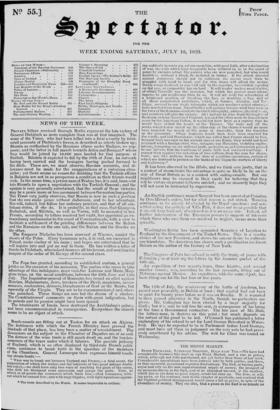Bomb-vessels are fitting out at Toulon for an attack on
Algiers. The feebleness with which the French Ministry have pressed the blockade of that plaee, has long been a matter of astonishment. The discussions on the subject in the Chamber of Deputies are at an end. The distress of the wine trade is still much dwelt on, and the burden- someness of the taxes under which it labours. The peevish jealousy of England, which is so often displayed by third-rate French politi- cians, continues to break forth in the speeches of the members of the Chambers. General Lamarque thus expresses himself touch- ing steam-boats :- "Were war to break out between England and France,—a fatal event, the supposition of which the wishes and the interests of two great nations doubt- less reject,—we shall have only two ways of reaching the giant of the ocean, who with his thousand arms surrounds and grasps the globe. First, to attack at all points the commerce which feeds him,—that commerce, with- out which he cannot live; and with large frigates, with light squadrons appear-
* The route described by Dr. Walsh. It seems impassable to artillery.
ing suddenly in every sea, return upon him, with good faith, after a declaration. of war, the evils which have frequently been inflicted on us in the midst of peace by enemies acting like pirates, who are now punished, but who would doubtless, without a blush, be imitated in future. If the attack directed against commerce should not he sufficient, the enemy must then be grappled with hand to hand, and for this steam will afford the means. Steam seems destined, as was well said by the reporter, to establish equality on the seas, as gunpowder has on land. It will render useless naval tactics, of which Tourville was the inventor, but which has proved more advan- tageous to our neighbours than to us. It will set aside the advantages of a windward position, of breaking the line, or doubling a line, and of all those complicated evolutions, which, at Saintes, Aboukir, and 'Pro - falgar, secured to our rivals triumphs which our mariners might otherwise have wrested from them. Naval battles will perhaps become what they were in the time of the Romans—contests iiiwhich intrepidity, address, physical fin cc, and numbers will give the victory. Ah ! had not he who from the heights of Boulogne so long threatened England, rejected the offers made to him for four years by the American Fulton, it would not have been as a captive that he would have visited the banks of the Thames. The forts and all the works which terror raised on the other side of the channel would no more have impeded the march of the army of Austerlitz, than the fencibles or the yeomanry. Other destinies would then have been reserved for the world ; and had Providence, which has willed that France should be free, brought back amongst us the ancient race of our Kings, they would not have returned with a foreign chief, who, stripping our Museums, violating capitu- lations, trampling on our national pride, proved to us, as Closterseven proved to our fathers, that the traditions of Punic faith had survived Carthage. I cannot then approve the reduction of two millions from the sum for steam- boats, nor two millions from the item of maritime operations, certain of which are destined to protect on the banks of the Tagus the martyrs of liberty and legitimacy."
It has been observed by the Globe, and we think very justly, that in a contest of steam-boats the advantage is quite as likely to be on the side of Great Britain as in a contest with sailing-vessels. But our neighbours may be excused in their vanity for believing that they will be victors on ground hitherto untried ; and we sincerely hope they will not soon be instructed by experience.


















